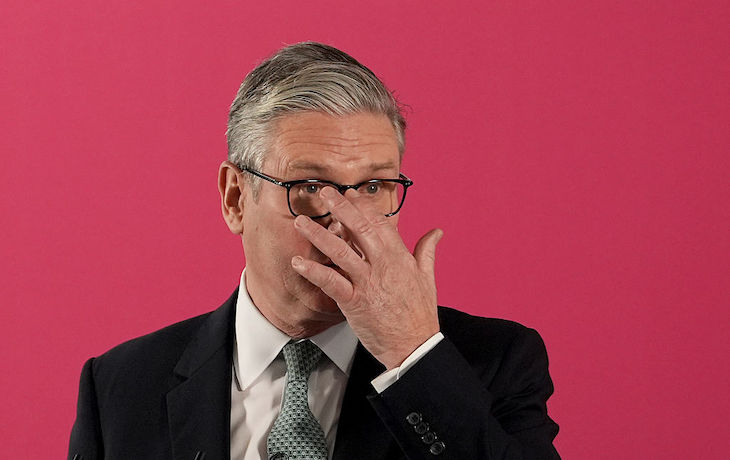Keir Starmer has met President Xi Jinping at the G20 summit in Rio de Janeiro, telling the Chinese leader that he wants to build ‘consistent, durable, respectful’ relations. China’s official Xinhua news agency said there was ‘vast space for cooperation’. It was the first meeting between a British prime minister and Xi since 2018, and Starmer proposed further top-level meetings.
Starmer clearly believes that Britain can ‘speak frankly’ where it disagrees with China while pursuing closer economic ties
The timing was unfortunate, not only because of the shadow of Donald Trump, and the prospect that a cosying of British relations with Beijing will put the UK at odds with a harder line from Washington. Currently, events are coming to a head in a Hong Kong courthouse. As early as Tuesday a trio of hand-picked judges will sentence 45 pro-democracy campaigners to potentially heavy jail terms for ‘conspiracy to commit subversion’. They have been convicted under a draconian national security law imposed by Beijing, which criminalises political opposition in the city, sweeping away a mini constitution that had been agreed with Britain and was enshrined in international law.
It is only the latest example of Xi’s intensifying repression, which has included attempts to irradicate the ethnic identity of the Uighurs in Xinjiang, with the state incarcerating more than a million people in ‘re-education’ camps. Xi has abolished time limits to his rule and overseen the imposition of a suffocating surveillance state across China to quickly identity and stamp out dissent. Military intimidation of democratic Taiwan has reached new levels and Putin’s war in Ukraine would not be sustainable without Chinese support.
Yet in Brazil, Starmer has insisted that none of this should be an obstacle to building a ‘pragmatic and serious relationship’ with Beijing. Underlying this is a belief that our economic relationship with China can be neatly separated from thorny issues of human rights and security. Starmer clearly believes that Britain can ‘speak frankly’ where it disagrees with China while pursuing closer economic ties. In reality, this approach is deeply flawed. Not only is it hard to find much in the way of frank speaking, but it woefully misunderstands the way China does business. Trade, investment and market access are routinely used by Beijing as instruments of coercion – ask Lithuania, which faced an economic boycott after allowing Taiwan to open a diplomatic mission in its own name; or Australia, which got the same treatment after demanding an independent investigation into the origin of Covid-19. And if there is one overriding lesson from the Ukraine war, it is the danger of economic dependence on a tyrant – whether they are in Moscow or Beijing.
It was only last year that Ken McCallum, the head of MI5, warned of the ‘epic scale’ of Chinese espionage against Britain. He warned of Chinese companies trying to gain access to sensitive technology developed by UK companies and universities. Earlier this year China was accused of hacking the UK’s Electoral Commission and accessing the personal information of 40 million voters. Beijing was also accused of targeting the Ministry of Defence’s payroll system containing the names, bank details and some addresses of up to 272,000 people.
Set against this background, Starmer’s pitch to Beijing looks a little desperate. He said it was right to cooperate with China in areas of mutual interest, such as climate action, yet there is little evidence that Beijing has any intention of being a good global citizen on emission controls. While it is true that China has invested heavily in clean energy, it remains addicted to coal and is the biggest emitter in the world of carbon dioxide. Its approach to climate action remains transactional, linking cooperation to concessions in other areas.
China is also the world’s leader in green energy technology production, but this is better seen as an industrial policy, rather than an environmental one. China’s renewable industries, including solar panels, wind turbines and electric vehicles (EVs) have received massive government subsidies and other support so they can dominate these sectors. Starmer appears to see the embrace of this tech as important to achieving his zero-carbon goals, but in Washington and Brussels there is far more caution – both from an economic and security perspective.
Both the EU and US have imposed tariffs on Chinese EVs. Their primary reason is to protect their own industries from what they regard as unfair competition. Yet, the security issues is potentially more worrying. EVs are connected computers on wheels, essentially one giant piece of spyware, perfect for espionage, surveillance and sabotage. The UK has so far resisted imposing its own tariffs but it could quickly come under pressure from the new Trump administration. Lest we forget, it was primarily American pressure that forced Boris Johnson to act against Huawei, removing the Chinese telecoms giant from our networks.
The last Conservative government at least put in place a number of updated security measures, covering foreign investment, influence operations and academic tie-ups. These were largely untested by the time the Tories lost power. Now they have been parked by Labour, pending its much vaunted ‘audit’ of relations with China.
Cyber security experts who follow China’s prolific spying, expect that as Beijing’s route for acquiring advanced tech by legitimate (or semi-legitimate) means is curtailed by US sanctions, Beijing will resort increasingly to cyber espionage, putting Britain’s world-beating research under ever greater threat. It is a deeply worrying picture, yet Starmer on Monday confirmed plans for Chancellor Rachel Reeves to visit Beijing early next year to hold talks about deepening economic and financial ties. This is at a time when China is facing multiple economic challenges from a slowing economy and a mountain of debt. To many that is another warning sign – that China’s economy is fast losing its power to seduce. Though not it seems for Starmer’s Labour government.








Comments